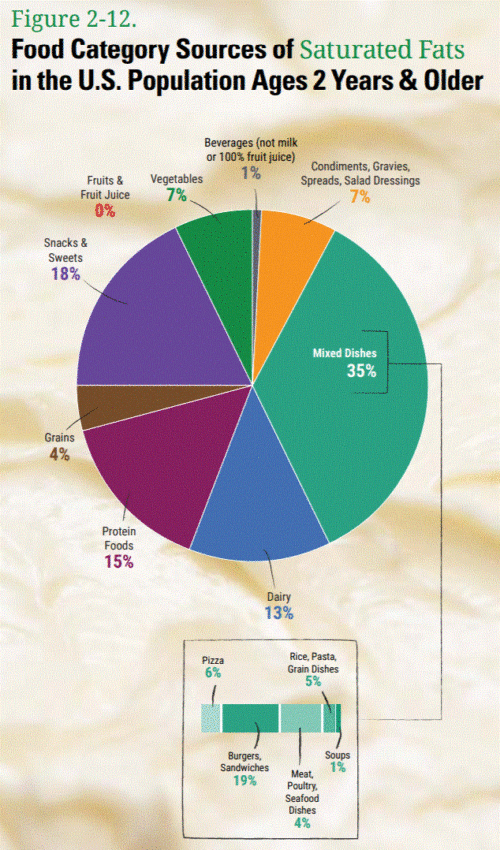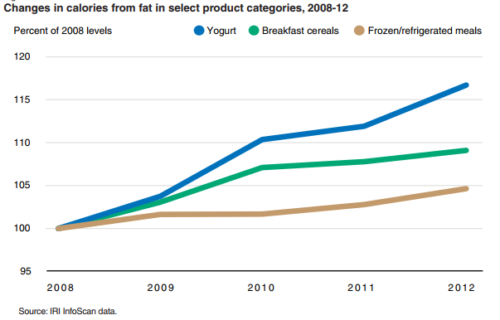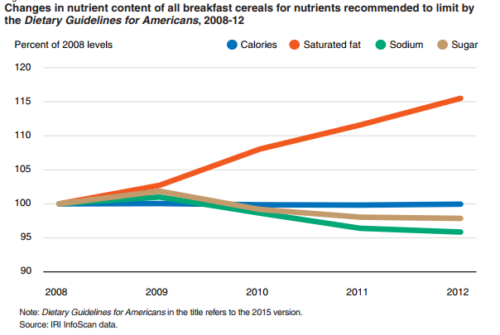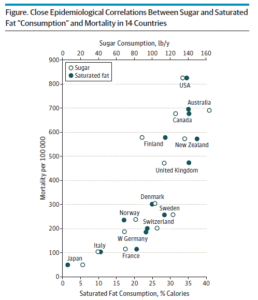Food Navigator’s collection of articles on “healthy fats”
Fat remains in the news. Which ones are health, and which not? FoodNavigator-USA collects its articles on the topic. My thoughts: Beyond that, food fats are mixtures of monounsaturated, polyunsaturated, and saturated fatty acids, of the omega-3, -6, and -9 varieties. And then there are the hydrogenated trans-fats. These variations make fats complicated.
One attribute of fats is not complicated: fat has 9 calories/gram compared to 4 for protein and carbohydrate. A tablespoon of oil, butter, lard, or tallow has about 100 calories. If you are concerned about energy balance, watch out for fat calories (and the other ones count too).
FoodNavigator’s Special Edition: Healthy fats
Fat – we are told – is back. But what kind of fat, and can you have too much of a good thing? Is the science changing on saturated fats? Is whole milk a better choice, or should we stick to low fat dairy? Is coconut oil as healthy as some marketers make out, and is the pressure off to reduce fat now all eyes are on added sugar? Get the lowdown on fat in this special edition…
- Chewing the fat: Need help navigating the healthy fats minefield?: Fats are often classed into good, bad and ugly categories. But do we know for sure which are which, and are consumers, food marketers, and health professionals all on the same page on this? Is the science really changing on saturated fats? And is the keto diet backed by sound science?.. Read
- Which fats do consumers think are healthiest (and are they on the same page as nutrition scientists)? Olive oil is routinely ranked by consumers as the healthiest fat, says Cargill. But other oils also high in healthy mono- and poly-unsaturated fats – soybean, corn, and canola oil – all rank lower than coconut oil (which is high in saturated fat), while perceptions of lard and tallow are also improving, highlighting a disconnect between what consumers think about fats, and what nutritional scientists are telling them… Read
- What’s trending in the oils and fats aisle? From ghee to pumpkin seed oil: Ghee – a ‘clarified butter’ produced by boiling butter and pouring off the butterfat, leaving milk sugar (lactose) and protein (casein and whey) behind – is very high in saturated fat, but it’s gaining traction among shoppers looking for something new in the butters and spreads aisle, says specialty oils brand Carrington Farms… Read
- Is saturated fat really ‘back?’ In short, no, argue experts at ICVN 2018:“So the ketogenic diet, sure, it will cause you to lose weight in the short term. So would cholera, or a cocaine binge, but that doesn’t mean it’s a good idea,” observed Dr David Katz at the 7th International Congress on Vegetarian Nutrition (ICVN) this week. “There is more than one way to eat badly and the American public is committed to exploring them all.”.. Watch now
- Replacing partially hydrogenated oils: In conversation with Qualisoy: With the June 18 deadline to drop partially hydrogenated oils (PHOs) fast approaching, most food manufacturers have found alternatives, from palm oil, to liquid oils blended with palm fractions. But R&D work on interesterified high oleic oils that perform even better in some challenging applications than first and second wave solutions is ongoing, says soy industry expert Qualisoy… Read
- Has coconut oil lost its luster? New data from SPINS shows sharp sales declines in 2017: US retail sales of culinary coconut oil – a category demonstrating explosive growth in recent years – have continued to decline, according to new data from SPINS, with the strongest reversal of fortunes in the conventional (MULO) channel, where sales soared by 38.8% in 2015, but fell 5.2% in 2016, and sank 25.9% in 2017… Read
- Limit trans-fats and saturated fats to reduce CVD risk – WHO: The World Health Organization (WHO) has launched a public consultation on draft guidelines for intake of saturated fats and trans-fats… Read
- Enzymatically interesterified oils in focus as PHO replacement deadline looms: There has been a recent growth in interest in enzymatic interesterification (EIE) as more formulators deploy the technology to replace partially hydrogenated oils (PHOs) in some challenging applications as the June 18 deadline* to phase them out approaches, says one leading enzyme supplier… Read
- Omega-3s from plants: ‘This technology is going to have a massive impact on the industry’: As demand for omega-3s continues to rise, alternative sources are being explored, with many think that genetically engineered oil seed crops could have a massive impact on easing pressure on fish stocks… Read
- NAOOA strengthens olive oil quality standards to boost consumer confidence and sales: “It’s critical to encourage more people to use olive oil, not to intimidate them by thinking they can’t afford it or they’re not going to get the real deal. That’s why we continue working to strengthen our standards and educate consumers,” says Joseph Profaci, executive director, North American Olive Oil Association (NAOOA)… Read
- FDA Commissioner: Removing PHOs from the food supply is a ‘significant public health achievement’:The FDA has made it clear it wants to remove all PHOs (partially hydrogenated oils) from the US food supply and has shot down the Grocery Manufacturers Association’s (GMA) petition seeking to allow specific and limited uses of PHOs… Read
- WHO pushes to remove artificial trans fat from diet and reduce overall trans fat intake: The World Health Organization’s draft recommendation that adults and children reduce trans-fatty acid intake to less than 1% of total energy and industrially produced trans-fatty acids be removed from the global supply chain leaves both public health and consumer rights advocates wanting more… Read
- ‘The lifestyle of including fat in your diet is here to stay’, says CoreFX CEO: The low-fat diet that was popular in past decades is an experiment that failed leading to a new relationship consumers have developed with food, particularly with “healthy fats”, says CoreFX Ingredients CEO, Denis Neville… Read
- FBOMB macadamia nut butter: ‘We’re very entrenched with the whole keto crowd right now’: While common when sitting at home on the couch, eating nut butters straight from the jar before hopping on a plane (if TSA didn’t confiscate) or during a rigorous workout can be a clumsy, messy experience, but FBOMB’s redesigned, single-serve pouches of macadamia nut butter solves for this pain point… Read
- ‘Don’t hold back’: Studies support eggs for heart health and prediabetics: An egg a day may reduce risk of stroke by 26%, and eating up to 12 per week does not negatively impact cholesterol for people with pre-diabetes or type 2 diabetes, according to a couple of new studies… Read








